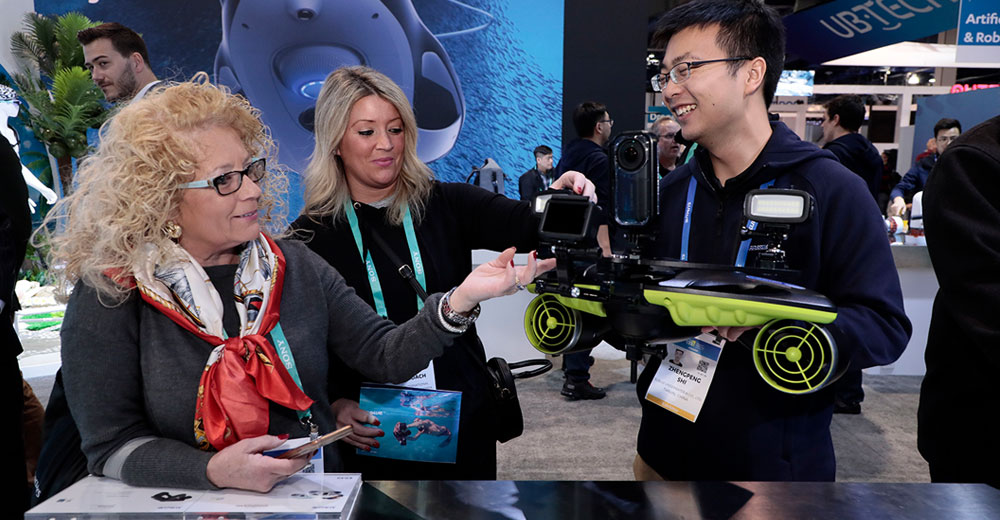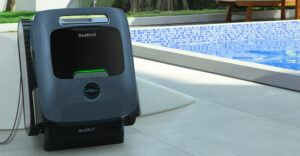This is the first week of the new year and, given how 2020 and 2021 were, I am feeling a bit of trepidation that 2022 could be worse.
The first big consumer event of 2022 is CES, and I still argue it’s way too soon after the holidays for a show that makes you want to spend more money just days after assessing the hole in our wallets from buying Christmas presents. But it is also the biggest consumer electronics show in the U.S., and it has historically been a wonderful place to see what is coming up for the new year.
I am not going to CES this year. It’s too risky given the Covid spike, even though I have been vaccinated and boostered. Typically, every other year I get the flu at CES, even though I always get those vaccines as well.
This year, the venue could be particularly contagious as many attendees will have just been with family members and not worn masks or distanced — and hugged and shaken hands with a lot of people who are infected. If infected, attendees would be symptomatic about when CES starts and will not self-quarantine, making it too risky for me to attend.
So, let’s talk about what I expect to appear at CES, and we will close with my first product of the week for 2022: Dell’s Concept Luna, the first truly sustainable laptop design.
Vehicle Technology
CES has evolved into a technology showcase for cars. It’s the place to see what car companies are thinking about for the future. The event has featured electric cars for years, along with advanced materials made with 3D printing technology, not to mention a considerable number of vehicles that fly rather than drive.
With more trials starting up, both with autonomous and flying vehicles, I expect more of that this year at the event — but with a greater focus on near-term execution and fewer pie-in-the-sky displays.
The companies that make these things are pivoting to revenue-focused products, which means what we will see should be a lot more near-term practical this year than in prior years. We might see the first Level 4 autonomous car concepts that have a high probability of being built this year, as well.
Nvidia will undoubtedly highlight its simulation advancements and computer brains for the cars during its keynote and have a far bigger emphasis on using its simulation tools to create robots for the home and for business.
We should also see more adoption of digital assistants tied to Amazon Alexa this year in cars. For me, this is big because currently I find the automotive voice interfaces useless.
Robotics
As for robots, I expect the show to have more of these than ever before as this technology has improved a great deal over the last couple of years. The shortage of employees and in-home help is really pushing the advancement of this technology.
We will have better robotic vacuums, robotic security products and drones, and we will begin to see the next generation of robotic pets. Amazon has been talking about an Echo product that is mobile, and CES is a good place for them to preview what should be a complete offering that they expect to ship in the first half of 2022.
Robots that clean windows, help around the house, and provide companionship to our aging population are also expected to be part of this event. I bet most of these will look too creepy to most of us. That uncanny valley problem, where the robots both look too real and not real enough has proven exceedingly difficult to overcome.
We should have a large number of drones with longer battery life highlighted at the show, as well as better AI-driven features and easier ways to comply with drone-based regulations. We may even see some anti-drone technologies highlighted at the CES, though these often are held back for events focused on security held later in the year.
Mixed Reality
Mixed reality continues to provide the promise of traveling electronically rather than physically, and it would not surprise me to see several firms using robots to provide telepresence experiences at CES.
Vastly improved AR and VR headsets, along with peripherals like connected chairs with vibration, wind and even scents to make the experience more realistic are expected at the show.
Oculus from Meta (Facebook) remains the top technology in the market for consumers, while Microsoft’s HoloLens remains the strongest technology for business. I anticipate updates for Oculus, but I expect Microsoft will wait until one of its own events to highlight advancements.
New alternatives to controllers for better immersion and to provide touch are expected, coupled with 2D treadmills that create more realism when moving through a virtual environment. Higher resolution optics and lighter headsets are also anticipated to show up at CES 2022, which should also create a far more immersive experience.
Connected Appliances
CES is where you go to see the most advanced appliances. That was where I first saw Samsung’s connected Flex Washer & Dryer laundry system I bought for our home. Much of what I currently have in terms of appliances are connected and some, like the Samsung refrigerator with a built-in internal camera, are handy.
Expect more of these to be tied into home automation platforms with Amazon’s Alexa again being in the connectivity lead — but with other companies attempting to challenge that lead and exceeding Amazon’s capabilities as they struggle to differentiate. But the battle will not be won on features so much as on standards, and here Amazon has what may be an insurmountable lead in terms of interoperability.
Personal Computers
PCs at CES are exclusively focused on consumers and we should see some interesting gaming machines at the event. There hasn’t been a lot of buzz on VR PC gaming of late, with more of a focus on traditional gaming. But expect a lot of large 4K displays with various configurations and more self-contained offerings.
This is the year Intel is expected to push back strongly on the belief that it is no longer competitive. I know it has been working with several vendors, including my Dell Concept Luna Product of the Week below.
One thing I’m looking forward to here is a keyboard advancement to address the massive improvement in Office 365’s predictive typing. Right now, the stretch to the right arrow button is too far for even my large hands which reduces productivity. I anticipate at least one keyboard or PC vendor to address this at CES this year.
Televisions
TVs will begin to highlight 8K capabilities along with more smart TV functions. They have been evolving into more of a PC-like product over time, and high-end offerings like LG’s OLED TVs, are running their own OS today (LG now uses the old Palm OS, called webOS).
Better wireless linking to your personal electronics, more energy efficient designs, and more functions that allow for a broader use of the TV (like for video conferencing or static images) could also pop up, along with the next generation of rollable displays that are more than a year away from general availability.
Projection TVs continue to provide ever better performance for those that can use them. Though in recent years home theaters have become a far less attractive home improvement than home offices.
Wrapping Up
CES remains the place to go to see the near-term future of technology and it will do this again in 2022.
I am worried it will also be a mass infection event so I am not going but will watch as much as I can remotely and will report on what I have seen that is interesting after the show.
If you go, make sure you check out the automotive section which has become my favorite. Remember that Covid will be all around you so distance, mask and wash your hands often as you do not want to end up in a Las Vegas hospital if you can avoid it.
Oh, and I hope you have an incredibly Happy New Year!

Dell Concept Luna
The Dell Concept Luna was announced just before Christmas and it is one of the most innovative laptops ever created. It does not sport innovative features like foldable displays or inductive charging, but what it does highlight is the most sustainable PC design conceived so far.
Modular in nature, it is designed to become a critical part of PC as a service (PCaaS) as well as the anti-Apple laptop since it’s designed to be easily serviced by anyone. It uses recycled materials heavily and is designed to be upgraded over time, either to address the needs of the existing user or to enable it to be passed down to subsequent users who cannot afford a new laptop.
It makes substantial use of recycled metals and carbon fiber, recycled plastics, and even water-soluble glue so that the motherboard can be more easily recycled at end-of-life.
Although not for sale yet, it has become a showcase of how much you can do to reduce waste. Even the manufacturing method reduces carbon dioxide emissions by 50 percent. It is more robust to stay in service longer and more energy efficient.
Designed with Intel’s help, Dell’s Concept Luna represents the state of the art when it comes to designing a sustainable laptop — and that makes it my product of the week.























































